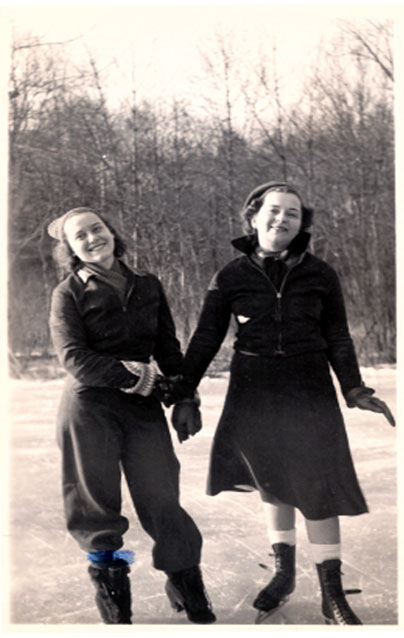
SUMMARY:
The family saga runs from the escape of the sisters' parents, Sam and Bessie Kaufman (neé Aronoff), from Russia during the first decade of the twentieth century, to Betty and Estelle's deaths about a century later. In between, the first children were born on Delancey Street, in Manhattan; the next ones, including Betty, on Boerum Street, Brooklyn; and the final batch, including Estelle, in New Jersey. Like all of their siblings, Betty and Estelle would move back to New York City, and like several of the others, they would end up in Florida. The Epilogue, by my daughter, Zoe Singer, carries the story into a fourth generation.
In all, there were six surviving children. Betty was the third-born and Estelle, the fifth. The others were Harry (#1), Jean (#2), Jack (#4), and Sandy (#6). Jack lived into his nineties, and Jean, into her late eighties, but the lives of Harry and Sandy were sadly truncated.
Most of the material for Betty and Estelle comes from a ninety-eight minute interview conducted on June 14th, 1997 with my mother, Betty Singer (November 24th, 1911 - August 21st, 1997), and her sister, Estelle Spelke (November 29th, 1916 - November 21st, 2002). The interview took place at Estelle's apartment in Tamarac, Florida, about a mile from my mother's apartment. The interviewers were Estelle's second child, Michele Spelke, and Michele's late husband, Bob Yuell.
Then, on December 1st, 2001, Michele and her brother, Ken Spelke, conducted a second interview as they drove Estelle around the family's principal home town, Jamesburg, New Jersey, which is about twenty miles from the nearest large town, New Brunswick. Much of this interview took the form of "Oh, look! That's where ..."
By 1997, both sisters were widows. Five months after the 1997 interview, my mother died, and five years after that, less than a year after the second interview, so did Estelle. Thus, both sisters lived to be eighty-six, in a sense completing a cycle of close affinity. Surviving today are Estelle's three children, Karen, Michele, and Ken. The four of us are now among the old people in our family.
NEW BRUNSWICK:
After the first Jamesburg years, the family moved to New Brunswick, where they lived next to the Raritan River.
Betty: We used to walk up and down the street with the neighbors upstairs. I made a few friends; it was like living. On the farm, there was nothing.
In front of the building, Sam operated a small luncheonette, where he sold sandwiches to the workers from the wholesale market across the road. By then, my mother was in third grade. Almost eighty years later, still sheepish, she made a confession. Explaining that her father never remembered to give her milk money for school, she would just take "some change" from the "little thing" where he kept the money from the sandwiches. "That was when I did a little stealing."
THE BIG HOUSE:
Betty: The doctors told my parents that Sandy had a condition. He'd be better off living in a more countrified atmosphere. He was coughing, or something.
Estelle: So whatever ... we moved [back] to Jamesburg. First of all, we were a big family in a small apartment, in New Brunswick.
"Condition," "Countrified": two staples of Betty and Estelle's euphemistic lexicon! At any rate, the family moved into a large home beside the railroad tracks on Gatzmer Avenue, which they were soon calling, "The Big House." This house still stands.
Estelle: It was all the way across town from school. We walked all the way to school every day, in all kinds of weather, a whole bunch of us. Nobody picked me up, and nobody drove me ... "The Big House," it sounds like a reformatory!
Betty: No! When it was sold, it became an old age home ... There were five upstairs bedrooms and four downstairs rooms, including the library. And that's where we had our services.
Keeping the house warm was a big problem. You couldn't play the piano, because your hands would freeze. Later [when Estelle was a teenager], Sam put in a bathroom and central heating.
Estelle: Betty jumped ahead. This was still the time of the outhouse. You know how President Carter's mother got on top of [sic] the television one time and said they were very comfortable, because they had a three-holer. [My mother titters.] Well, our family only had a one-holer, so we must have been rather poor ...
The sisters agreed that the house always had running water, but only in the kitchen, where they bathed in a galvanized tub with water heated in the stove. They disagreed about whether they got dressed under the feather beds upstairs or in front of the stove.
Estelle: I can describe my little room almost like Picasso described his little house with the chestnut tree outside.
Betty: The three brothers shared the first big bedroom. Remember, Estelle?
Estelle: Yes, I don't know why. Jean had a room, and you had a room. And I had a little room.
Betty: Then, you shared a room with me. We had a double bed. We wanted to sleep together because it was warmer. We used to talk half a night. We were always close, from then on.
The Train:
Estelle: When we first moved in, I was out in the yard right beside the railroad tracks. I saw the train coming, and, you know, when you see a train coming in the distance ... it looked like it was coming straight at me! And I ran into the house, frantic. I said, "This train is coming into our house!" [The sisters laugh.] I must have been five years old. My mother would say, "No, it's going to stay on the track."
To be continued ...

The Piker Press moderates all comments.
Click here for the commenting policy.